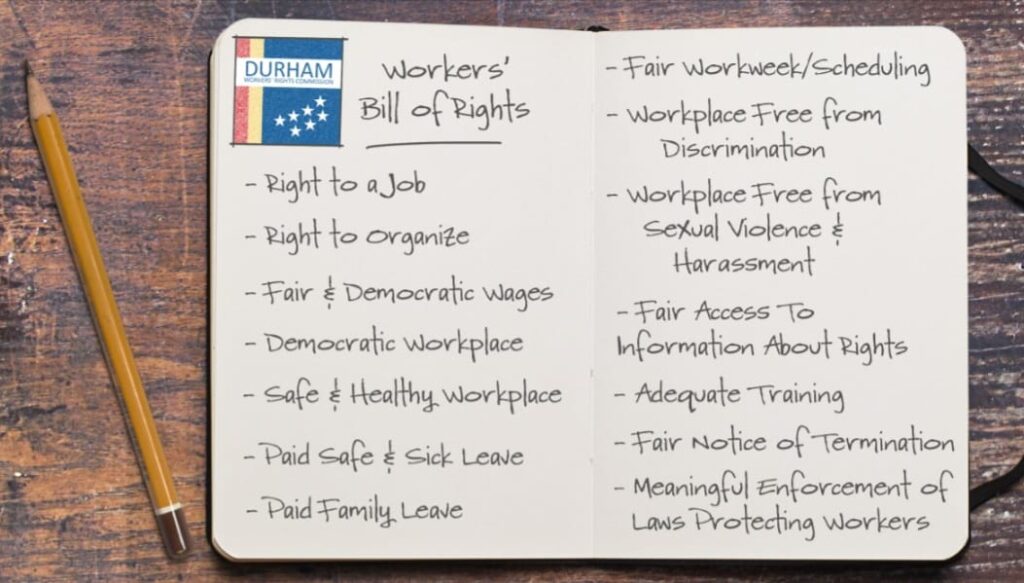
Note: If you are a Durham city worker and feel that any of these rights are being violated, contact the Union today so we can develop a plan of collective action to enforce these rights. Call us at 919-539-2051
Durham Workers’ Bill of Rights
A PRODUCT OF THE DURHAM WORKERS’ RIGHTS COMMISSION, Approved by the Durham City Council on November 17, 2020
Mission: ” People cannot be free until there is enough work in this land to give everybody a job .” -Ella Baker
The Durham Workers’ Rights Commission was established in 2019, tasked with crafting an aspirational workers’ bill of rights that might help raise working conditions by serving as a guidepost for all workers and employers in the city. This document contains the ideas and principles that the commission believes would benefit all workers — and all those who want to work — in the City of Durham and beyond.
Rights Common to All Workers
1. Right to a Job
Every person who wants to work deserves a job and fair wages. The City of Durham should attempt to ensure the availability of secure employment opportunities for all who want them.
2. Right to Organize Without Retaliation
Workers have a right to join together in a range of activities related to work issues that matter to them, including whether they want to be represented by a union. Employers should not threaten, discriminate against, or otherwise act against workers for organizing or talking with coworkers about working conditions.
3. Democratic Workplace
Company decision making should be a collaborative and democratic process that prioritizes the well-being of the workforce. Workers have a right to direct participation or elected representation in company decision-making.
4. Fair and Democratic Wages
Workers must be paid for every hour worked, including work before and/or after scheduled shift and time spent traveling during the workday.
Every worker must be paid a livable wage.
Every worker must be paid in a timely fashion.
Every worker must be paid overtime — at least 1.5 times the regular rate of pay for hours above 40 in a single week.
Workers have a right to collectively establish or negotiate wages for each position in the workforce.
5. Fair Workweek
Workers have a right to a fair work schedule, including the following:
● A written, good-faith estimate of the employee’s expected duties and job description and expected work schedule prior to or upon employment in a language or method the worker can understand;
● A work schedule in writing provided in a fair and timely manner prior to the first day of the work schedule;
● Compensation for work schedule changes
● Meaningful input into work schedule
● Substantial time to rest between work shifts and from week to week
● Ability to exercise of the above rights free from retaliation
6. Paid Safe and Sick Leave
Workers have a right to paid sick and safe leave:
● Sick leave can be used for care and treatment for the worker or to care for anyone the worker considers family.
● Safe leave can be used for the worker or anyone the worker considers family in order to seek help or take other safety measures for any act or threat of domestic violence, unwanted sexual contact, stalking, or human trafficking
Employers must not retaliate against workers who request to use safe and sick leave.
7. Paid Family Leave
Workers have a right to paid family leave to bond with a new child or care for a close relative with a serious health condition.
8. Fair Notice of Termination
Workers have a right to receive written notice of termination weeks in advance of the worker’s final day of employment.
9. Adequate Training, Contracts, And Record-Keeping
Workers have a right to be provided the following in a language or method the worker can understand:
● adequate, documented job training
● important documents and information related to employment (e.g., pay stubs, work manuals, tax forms)
● freelance workers have a right to a written contract.
10. Workplace Free from Discrimination
Employers or job recruiters must not discriminate on the basis of a worker or potential worker’s:
● Age
● Alienage or Citizenship Status
● Race, Ethnicity or Color
● Disability or Perceived Disability
● Sex, Gender, or Gender Identity
● Marital or Partnership Status
● National Origin
● Pregnancy
● Religion/Creed
● Sexual Orientation
● Arrest or Conviction Record
● Caregiver Status
● Consumer Credit History
● Unemployment Status
● Status as a Victim of Domestic Violence, Stalking, and Sex Offenses
● Retaliation for Opposing Discriminatory Practices
● Genetics
● Familial Status
● Military Status
11. Workplace Free from Sexual Violence and Harassment
Workers have a right to a workplace free from sexual assault, harassment, coercion or any other form of sexual violence or intimidation. Workers must not be retaliated against for reporting sexual assault or harassment that they have experienced, witnessed or were made aware of by someone experiencing or witnessing said acts.
12. Safe and Healthy Workplace
Every workplace must be free of known health and safety hazards. Workers have the right to receive information and training about job hazards.
Workers deemed essential during unusual and dangerous circumstances are entitled to hazard pay and the option to refuse shifts without fear of retaliation.
13. Fair Access to Information About Rights and Remedy
Workers must be provided information about their rights — federal, state, and local — in a language or method the worker can understand. The methods of pursuing remedy against employers who violate a worker’s rights must be clear, affordable, accessible and free from
retaliation.
14. Meaningful Enforcement of Laws Protecting Workers
Established legal protections for workers must be meaningfully and equitably enforced by the government agencies and representatives imbued with the power to do so. Workers should be given the opportunity, the platform, and the powers necessary to advise, oversee or investigate any agency or other regulatory body whose failure to enforce the laws has threatened or harmed the safety and well-being of workers within its jurisdiction.
If you are a Durham city worker and feel that any of these rights are being violated, contact the Union today so we can develop a plan of collective action to enforce these rights. Call us at 919-539-2051
To learn more about the Durham Workers Rights Commission, visit https://www.facebook.com/durhamworkersrights
